October 2025
The deck boat market accounted for USD 2.16 billion in 2025 and is expected to reach around USD 6.76 billion by 2034, growing with a CAGR of 13.5% from 2025 to 2034. This market is growing due to increasing demand for versatile recreational watercraft that offers spacious seating and smooth performance for family and group outings.
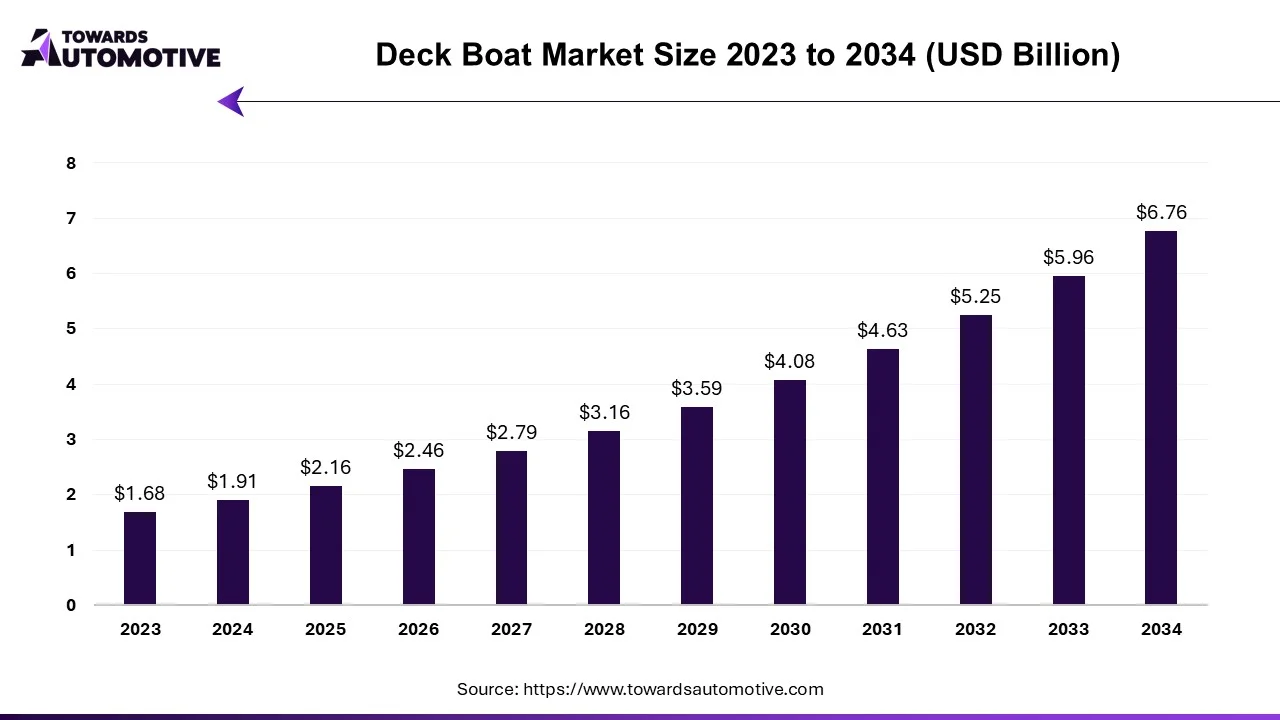
AI plays a transformative role in predictive maintenance and performance monitoring for deck boats by enabling smarter, real-time decision-making. Sensors IoT devices and AI algorithms can be integrated to continuously monitor vital boat systems for indications of wear irregularities or inefficiencies. AI examines this data to anticipate possible problems before they arise, enabling prompt maintenance that lowers unplanned malfunctions and increases the boat's lifespan.
To maximize fuel efficiency, identify malfunctioning parts and provide boat owners with useful advice. AI-powered systems can also monitor usage trends, environmental factors, and engine performance. This improves safety and the overall boating experience in addition to reducing downtime and repair expenses. AI is transforming deck boat owners' maintenance and performance management by moving from reactive to proactive maintenance.
The deck boat market is experiencing steady growth driven by rising consumer interest in leisure and recreational boating. Families and groups can enjoy a variety of activities on these boats including cruising fishing and water sports thanks to their roomy layout and adaptability.
The appeal of weekend getaways and water-based tourism has grown particularly among younger audiences and first-time purchasers. A larger audience is also being drawn in by improvements in boat design, engine efficiency, and comfort features, and market offerings are changing due to rising interest in electric and sustainable boating options.
Deck boat demand is rising dramatically as a result of growing interest in outdoor leisure and water-based recreation. This is because changing consumer lifestyles place a higher value on outdoor family-friendly and experience-driven activities. Boating offers a sense of freedom, relaxation, and social bonding qualities that deck boats are uniquely designed to support due to their spacious layout, comfort, and versatility as people look for alternatives to indoor entertainment, particularly in a post-pandemic world. Whether used for fishing cruising or water sports deck boats offer the perfect way to take in the scenery without compromising on comfort or design. This change in leisure tastes is attracting new customers and boosting involvement in marine sports, which will ultimately support the deck boat market's steady expansion.
Rising disposable income is directly influencing the purchases of recreational boats like deck boats by enabling more consumers to spend on luxury and lifestyle experiences. As people and families become more financially stable, they are more inclined to spend money on enjoyable but non-essential items like personal boats. This group of aspirational buyers is particularly drawn to deck boats because of their comfort versatility and sustainability for social functions.
Ownership becomes more feasible with higher income because it also covers related expenses like fuel insurance maintenance and docking. Furthermore, wealthy customers are looking for more individualized leisure experiences, and deck boats provide the ideal balance of leisure and prestige, which helps explain why they are becoming increasingly popular in premium and upper-middle-class markets.
A deck board purchase entails a substantial financial outlay, frequently on par with purchasing a luxury car. In addition to the initial cost, recurring expenses like fuel, regular maintenance, insurance, docking fees, and winter storage can mount rapidly. For consumers on a tight budget, ownership becomes financially difficult due to these ongoing costs.
For many people, the limited number of days they use the boat is outweighed by the total cost of ownership. Potential buyers might therefore decide to postpone purchases or choose to rent. Growth in emerging or price-sensitive markets is especially impacted by this cost barrier.
Deck boats, which are usually used in the spring and summer in temperate climates, are heavily reliant on favorable weather conditions. The boating season is considerably reduced in regions with long winters or heavy precipitation. The investment's perceived value is diminished by this seasonal restriction which limits its usefulness. To keep the boat safe during the off-season, owners might also need to spend money on maintenance and storage.
These weather-related limitations deter year-round participation and lower sales in areas with erratic weather patterns. The product's seasonality detracts from its appeal to infrequent users.
Demand for electric or hybrid deck boats that lower noise pollution and carbon emissions is rising as environmental consciousness rises. This creates new markets, particularly in areas with stringent laws governing the marine environment.
Manufacturers can set themselves apart and draw in eco-aware customers by investing in sustainable materials and clean propulsion technologies. Moreover, government financing and incentives for electric marine infrastructure could promote uptake. This trend offers a robust path for innovation and brand leadership in the green boating industry.
Deck boats are becoming more appealing to tech-savvy consumers because of the incorporation of smart technologies like GPS-enabled navigation, onboard Wi-Fi, fish finders, AI-based diagnostics, and entertainment systems. Upselling and premium pricing opportunities are being generated by this digital transformation.
By incorporating safety automation features and user-friendly digital dashboards, manufacturers can increase customer satisfaction and draw in new customers. Deck boats are in a good position to satisfy the growing demand for individualized connected boating experiences. Additionally, improved technology offerings raise perceived value and distinction.
Single-decked boats dominate the deck boat market because they are versatile for a range of recreational activities, have an easy-to-use design, and require less production and maintenance. Both novice and expert boaters like these vessels because they are easy to maneuver, provide plenty of space for facilities and groups, and are well-liked by both. Customers' desire for affordable multipurpose recreational boats is met by their useful design.
Double-decked boats are witnessing rapid growth owing to rising demand for more space, upscale amenities, and improved traveler experiences. These boats are perfect for parties' excursions and high-end experiences because they can accommodate larger groups and have additional features like sun decks, lounges, and upper-level seating. This market is growing quickly as travel agencies and affluent customers look for upscale boating options.
Wakeboard remains the dominant application in the deck boat market because deck boats are perfect for towing sports because of their strong engine, wide hulls, and exceptional stability. For adventure-seeking water sport enthusiasts, their roomy layouts make it simple to move around and store equipment on board. The dominance of this segment is further supported by the growing appeal of wakeboarding competitors and social media-driven sports trends.
Wakesurf is the fastest-growing application due to rising interest in low-impact, lifestyle-oriented watersports that are accessible to all age groups. Unlike wakeboarding, wake surfing requires lower boat speeds, making it safer and more appealing to a broader range of customers.
Deck boats are now being designed or retrofitted with surf-specific features such as wave generators and ballast tanks, boosting their adoption in this niche. Social media trends, influencer-driven content, and a strong push from boating brands to promote wakesurf-specific models are further accelerating the popularity of this sport across recreational boating communities.
Internal combustion engine-powered deck boats dominate the market thanks to their superior power, durability, and well-established fueling infrastructure. These boats are particularly valued for their performance in high-speed cursing and watersports, making them a go-to option for recreational users. Additionally, consumer familiarity with extended range and reliability in different water conditions contribute to their ongoing preference.
Electric deck boats are the fastest-growing segment as environmental awareness and sustainability-focused regulations push consumers and manufacturers toward cleaner alternatives. Advances in battery technology and charging infrastructure, coupled with reduced noise and operating costs, are making electric boats increasingly attractive. Governments are also offering subsidies and incentives that encourage adoption, especially in eco-sensitive zones and tourist areas.
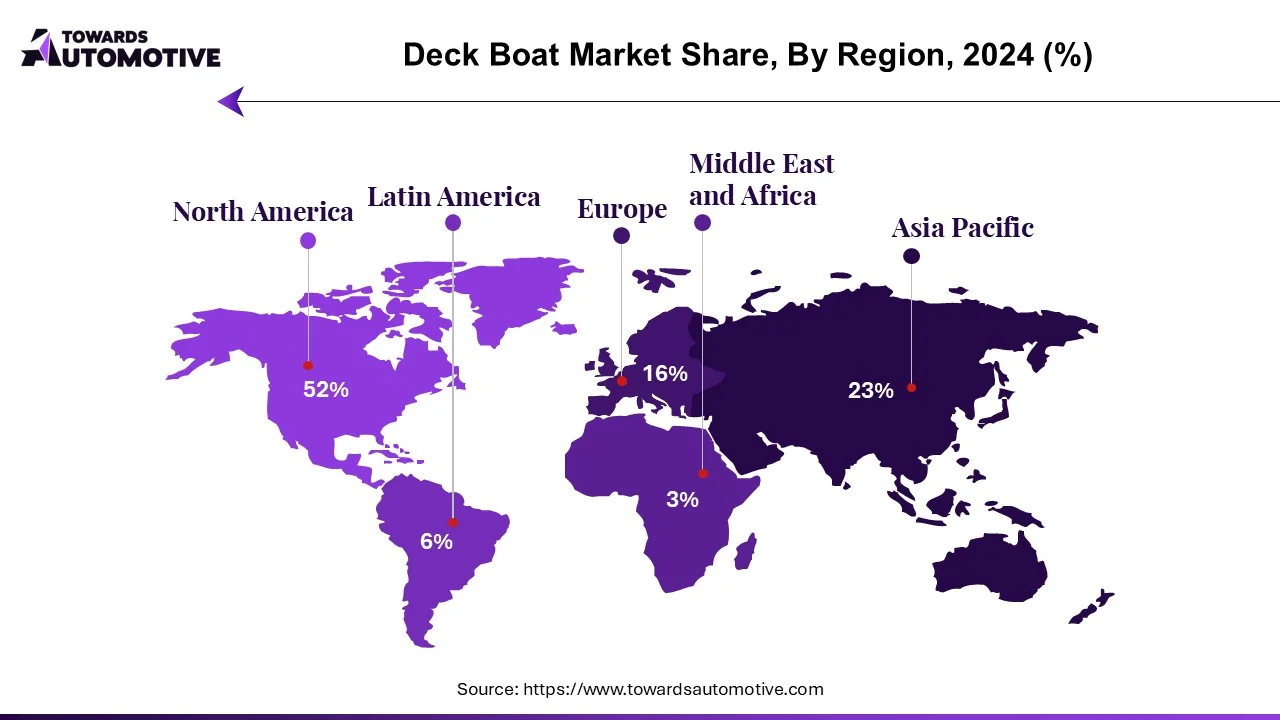
North America leads the deck boat market due to its vast network of lakes, rivers, and coastal areas supporting recreational boating. It has a mature marine industry, high disposable incomes, and a strong cultural affinity for leisure boating. Well-established boating clubs' marinas and supportive government policies further reinforce the region's market dominance. Furthermore, seasonal boating events, tournaments, and favorable finding options further propel deck boat sales across the region.
Asia Pacific is the fastest-growing region, driven by urbanization, an increase in disposable income, and a growing desire for recreational activities that involve water. Boating is emerging as a preferred recreational activity among younger demographics and affluent families. The region is witnessing growing investments in marine tourism, luxury resorts, and waterfront infrastructure which directly boost demand for deck boats. Additionally, rising interest in watersports, coupled with increasing social media exposure to boating lifestyles, is accelerating market expansion in this region.
The small autonomous pleasure boats market is anticipated to grow from USD 480.18 million in 2025 to USD 1,117.50 million by 2034, with a compound annual growth rate (CAGR) of 9.84% during the forecast period from 2025 to 2034.
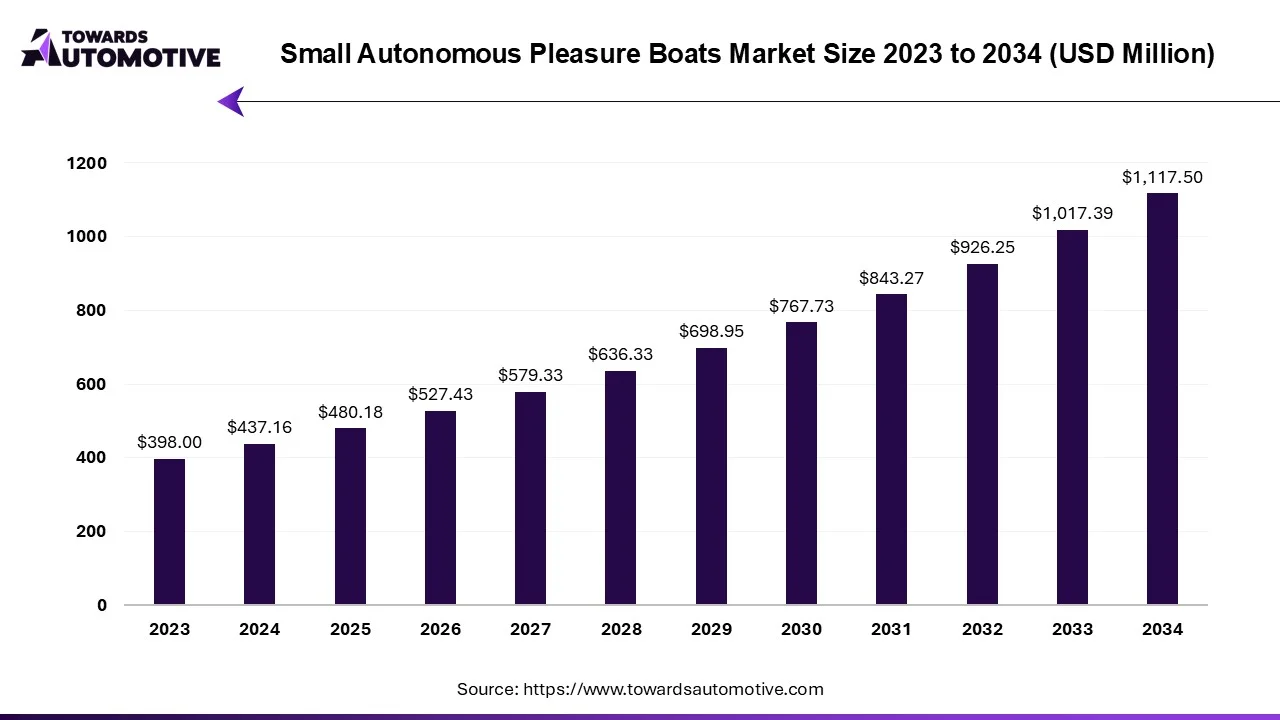
The autonomous boats market is forecast to grow from USD 648.60 million in 2025 to USD 1460.69 million by 2034, driven by a CAGR of 9.44% from 2025 to 2034.
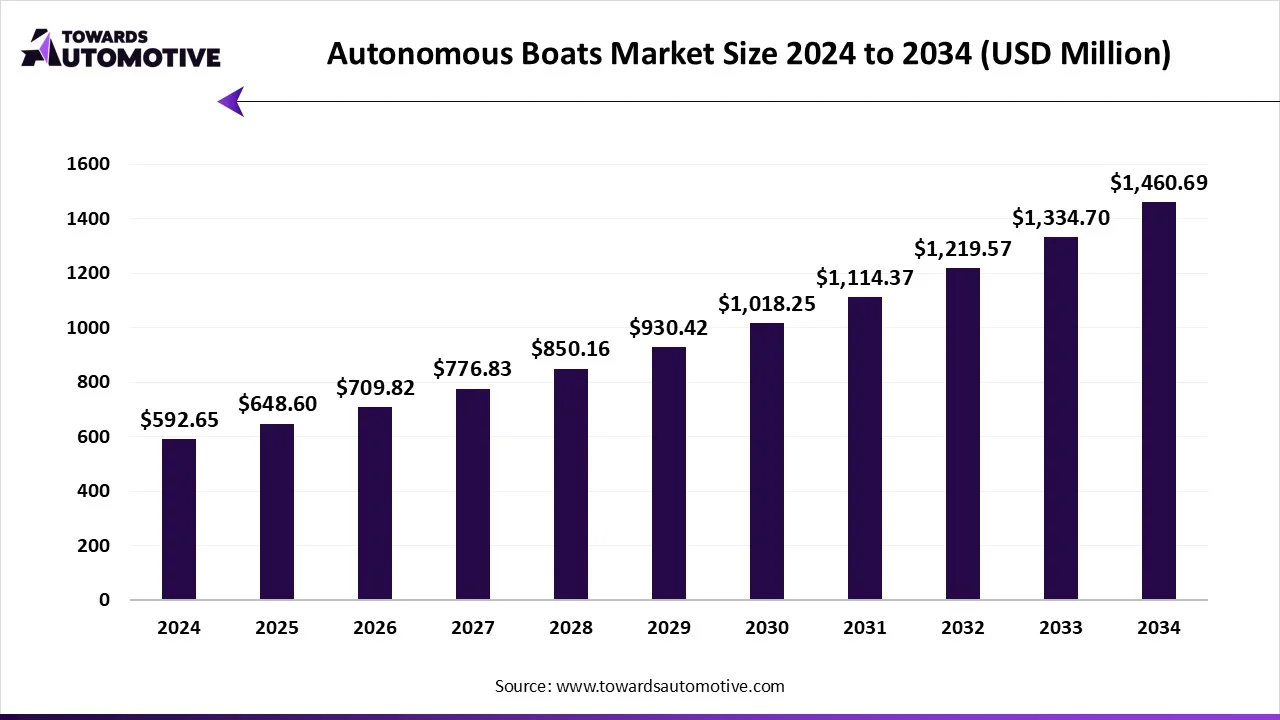
The autonomous boats market is a prominent sector of the marine industry. This industry deals in manufacturing and distribution of self-driving boats across the world. There are various types of boats developed in this sector comprising of fully autonomous boats, semi-autonomous boats, remote controlled boats and others. These boats are powered using different propulsion technology consisting of hybrid electric, fuel powered, fully electric and others.
The boat and ship telematics market is projected to reach USD 7.33 billion by 2034, expanding from USD 3.18 billion in 2025, at an annual growth rate of 9.72% during the forecast period from 2025 to 2034.
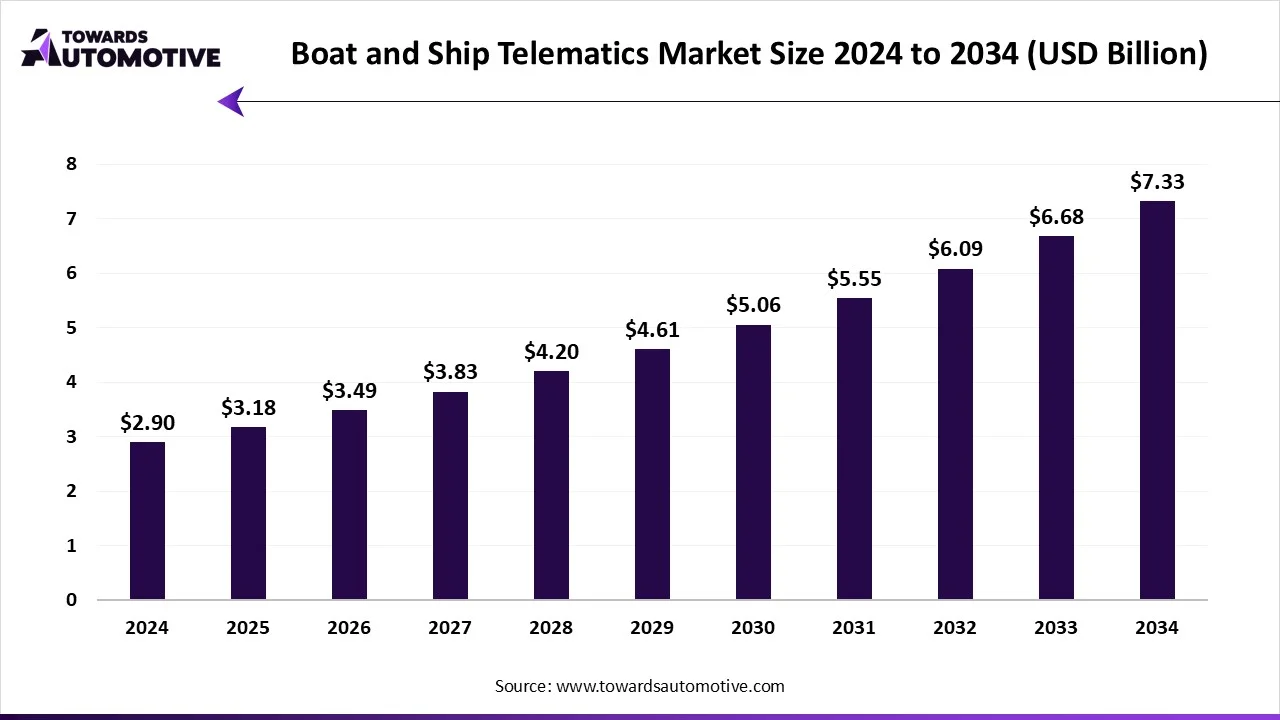
The boat and ship telematics market is a prominent branch of the marine industry. This industry deals in developing solutions for tracking boats and ships across the world. There are various components of these solutions including hardware, software and services. These solutions use different types of technologies such as GPS tracking, satellite communication, IoT enabled devices, telematics software and some others.
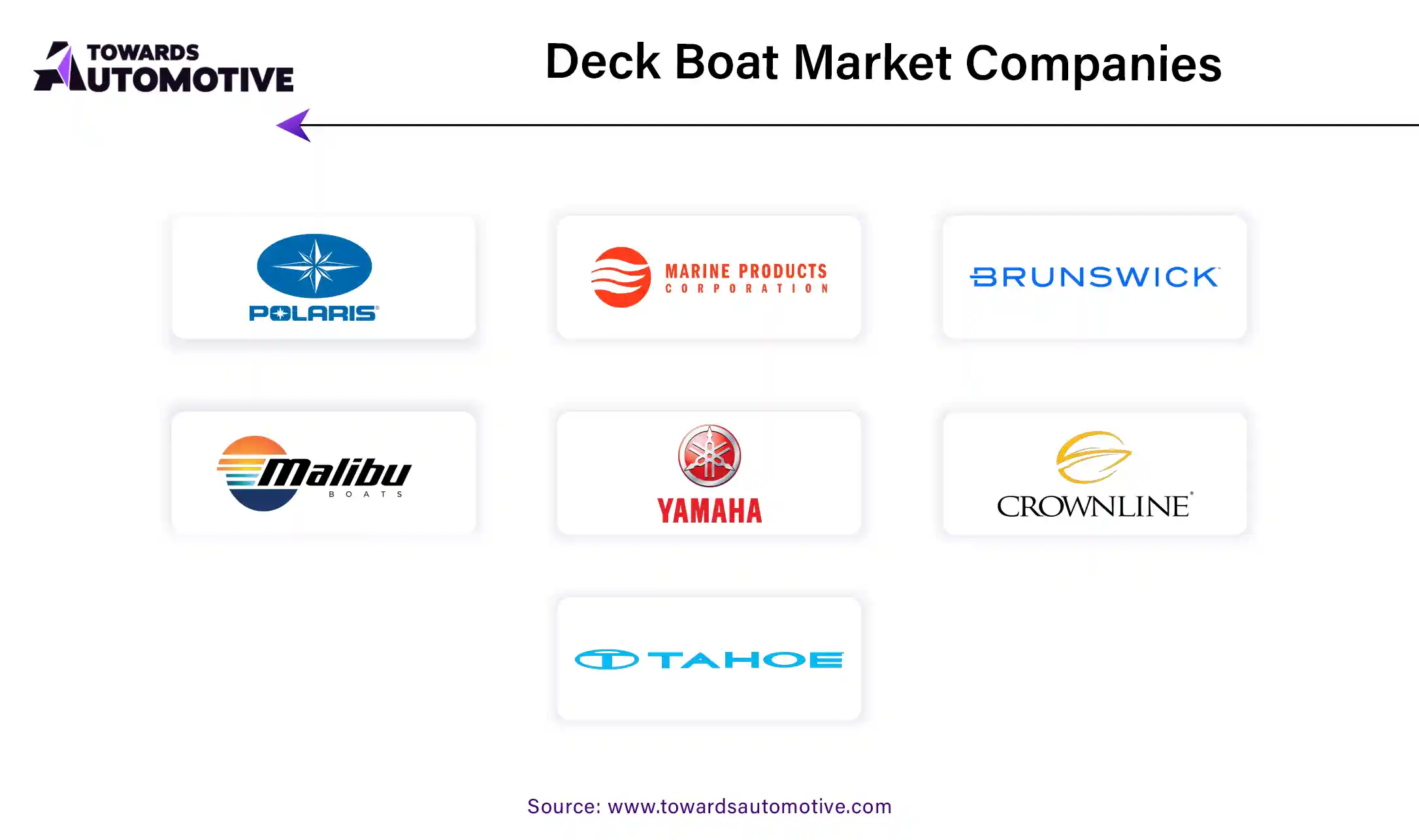
By Type
By Application
By Source
By Geographic
October 2025
October 2025
October 2025
October 2025
We offer automotive expertise for market projections and customizable research, adaptable to diverse strategic approaches.
Contact Us